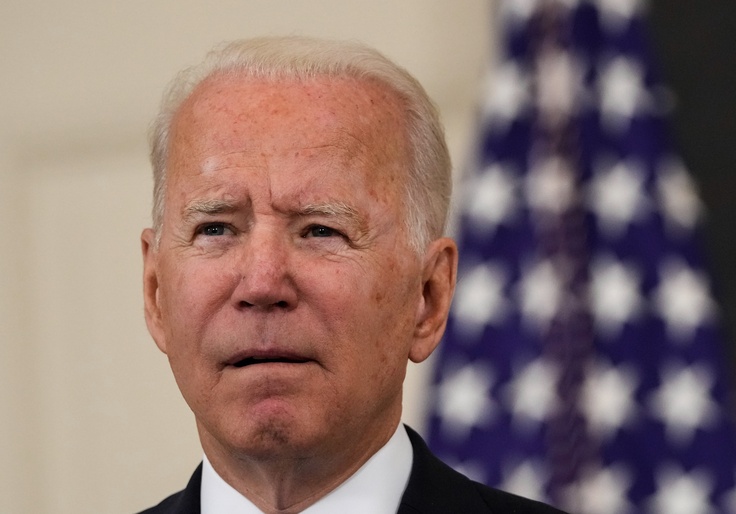The Biden administration's full withdrawal from Afghanistan could leave behind a U.S. Navy veteran kidnapped by the Taliban.
Haqqani network operatives backed by the Taliban abducted Mark Frerichs, a civilian contractor in Afghanistan for the U.S. government, in January 2020. The government has made little progress in retrieving the Navy veteran. U.S. authorities have been able to establish that Frerichs is alive, but have yet to disclose his whereabouts. The State Department has briefed lawmakers in recent weeks, but according to Rep. Mike Waltz (R., Fla.), a former Green Beret in Afghanistan and lead advocate for bringing Frerichs home, the Biden administration's opacity has hindered the urgent recovery operation.
"I am incredibly frustrated by their lack of responsiveness and lack of answers," Waltz told the Washington Free Beacon. "The question is: What's the plan now?"
The United States faces dwindling leverage over the Taliban amid a public deadline for withdrawal. As the Biden administration completes a full evacuation of military forces from Afghanistan, the Taliban are waging a violent offensive across the country, effectively squeezing the Afghan government—which receives backing from the United States—out of power. President Joe Biden conceded in a July speech that the Taliban are at their strongest since 2001, and analysis from the Foundation for Defense of Democracies shows the terrorists took control of some 139 districts in the country in two months. American nationals are not the sole focus of the pull-out. The State Department is scrambling to evacuate Afghan translators from the country as the Taliban steamroll through local security forces.
The State Department, Justice Department—which often plays a role in international hostage negotiations—and White House did not return requests for comment. Biden mentioned Frerichs's name for the first time in a July speech, but it is unclear if government authorities have yet met with the hostage's family. A U.S. government official familiar with the matter, who requested anonymity to speak candidly, told the Free Beacon they are working on Frerichs's release with "focused purpose."
"Mark shouldn't be held against his will far away," the official said. "He should be home with his family. As the president said in his remarks to the American people about Afghanistan a couple of weeks ago, we are going to continue to work for the release of detained Americans, including Mark. Our team is very focused on Mark's case, bringing together experts from across the government."
Bill Roggio, a senior fellow at the Foundation for Defense of Democracies, said the dwindling strength of America's position makes for much tougher negotiations with the Taliban to secure the release of hostages.
"The United States continues to back negotiations with the Taliban as they rampage across Afghanistan, so I'm not sure what kind of leverage the U.S. government has to secure Frerichs's release," Roggio said. "The United States just continues to look weaker and weaker while the Taliban continue to look stronger. The administration has very tough cards to play. They basically need to give up the deck to get one card back."
Roggio also noted that the United States' slipping foothold in Afghanistan could up the Taliban's asking price to return Frerichs. The Taliban have repeatedly asked for the return of Bashir Noorzai, a narcotics trafficker often called the "Pablo Escobar of the Middle East," in exchange for Frerichs—a price which Roggio says comes with complications.
Another possible play left in the Biden administration's playbook could be appealing to Pakistan, a U.S. ally that has consistent channels of communications with the Haqqani network. When Afghan terrorists kidnapped U.S. citizen Caitlan Coleman and her husband in 2012, it took close cooperation with the Pakistani government to get a breakthrough in their case in 2017. Lisa Curtis, a former senior White House official who worked on Afghan issues and program director at the Center for a New American Security, told the Free Beacon that looking to Pakistan could prove vital.
"Now that U.S. forces are out of Afghanistan, we are really going to have to look to the Pakistanis to use their leverage with these groups to get him released," Curtis said. "It took a great deal of pressure from the Trump administration on the Pakistani government [to secure Coleman]. I'm not sure the Biden administration has exerted that kind of influence with the Pakistanis. ...We're losing leverage very fast now."
Frerichs's family could not be reached for comment in time for publication.
